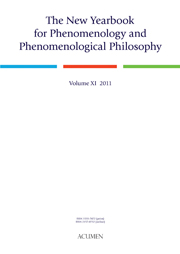Book contents
- Frontmatter
- Contents
- Articles
- Discussion
- Jacob Klein's Two Prescient Discoveries
- On the Mathematical Representation of Spacetime: A Case Study in Historical–Phenomenological Desedimentation
- Splitting the Movάς: Jacob Klein's Math Book reconsidered (Part I)
- History of Physics and the Thought of Jacob Klein
- Jacob Klein on the Dispute Between Plato and Aristotle Regarding Number
- Klein on Aristotle on Number
- The Philosophical Achievement of Jacob Klein
- In Review
- Conclusion
Splitting the Movάς: Jacob Klein's Math Book reconsidered (Part I)
from Discussion
- Frontmatter
- Contents
- Articles
- Discussion
- Jacob Klein's Two Prescient Discoveries
- On the Mathematical Representation of Spacetime: A Case Study in Historical–Phenomenological Desedimentation
- Splitting the Movάς: Jacob Klein's Math Book reconsidered (Part I)
- History of Physics and the Thought of Jacob Klein
- Jacob Klein on the Dispute Between Plato and Aristotle Regarding Number
- Klein on Aristotle on Number
- The Philosophical Achievement of Jacob Klein
- In Review
- Conclusion
Summary
Abstract: This paper assesses the philosophical heritage of Jacob Klein's thought through an analysis of the key tenets of his Greek Mathematical Thought and the Origin of Algebra. Threads of Klein's thought are distinguished and subsequently singled out (phenomenological, epistemological, and anti-ontological; historical, ontological, and critical), and the peculiar way in which Klein's project brings together ontology and history of mathematics is investigated. Plato's theoretical logistic and Klein's understanding thereof are questioned—especially the claim that the Platonic distinction between practical and theoretical logistic is historically neglected because of Plato's understanding of the manner of being of mathematical objects—in order to advance the claim that Klein ontologically overdetermines the history of mathematics in a manner that ends up limiting some of his most brilliant analyses of the Greek conception of “numbers” and the philosophical meaning of the notion of “multiplicity.”
Keywords: Jacob Klein; Plato; Greek mathematics; Martin Heidegger; Burt Hopkins.
Introduction
1 The Threads and the Net
1.1. Like all philosophical masterworks, Jacob Klein's groundbreaking Greek Mathematical Thought and the Origin of Algebra (henceforth “Math Book”) can be read in many different ways: as an essay on phenomenology, following the footsteps of the late Husserl; as a study of the history of science on the pre-modern roots of algebra; as a Heidegger-inspired ontological research on the Greek understanding of Being; as a piece of Kulturkritik directed against modern science and its pitfalls; and so on.
- Type
- Chapter
- Information
- The New Yearbook for Phenomenology and Phenomenological PhilosophyVolume XI 2011, pp. 187 - 213Publisher: Acumen PublishingPrint publication year: 2012



